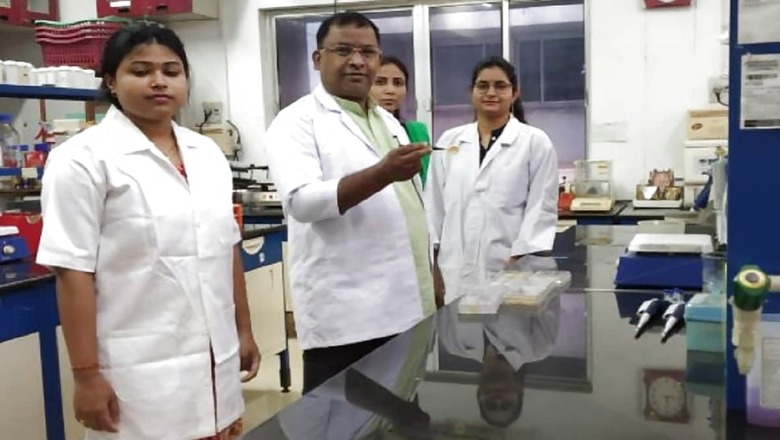
views
A turmeric-based adhesive bandage invented by a scientist in Odisha can be a game-changer in the herb’s wound-healing properties. Dr Sanjeeb Sahoo, a senior scientist at Bhubaneswar-based Institute of Life Sciences (ILS), has developed a prototype of an adhesive bandage that puts curcumin, the active ingredient in turmeric, in a sturdy, reliable base that can be used as a band-aid.
“Turmeric has long been used in India as an anti-inflammatory, anti-bacterial and anti-fungal medicine. A pinch of turmeric dust in warm milk relieves sore throat. It used to be applied in childbirth in women and cows. But the great anti-inflammatory powers of turmeric could not be fully utilised so far for lack of a reliable application system. Our innovation makes it possible,” said Dr Sahoo to News18.
Since an anti-inflammatory and anti-bacterial concoction has to be applied topically, the problem with turmeric has been its insolubility in water. By using a “bit of nanotechnology,” said Dr Sahoo, he has succeeded in making a curcumin emulsion with a lipid and blended it in a sponge-like frame of alginate and chitosan, two biocompatible and biodegradable polymers long used gainfully in drug delivery. The frame, he explained, is somewhat like the abrasive scrubber pad Scotch-Brite.
“Many scientific laboratories across the world have been working to increase the stability of curcumin in blood. Due to its poor kinetics, curcumin breaks down in blood fast and loses all its properties. The band-aid we have developed ensures that curcumin works more effectively and for longer periods on a wound. It even works better than curcumin ointments and gels,” said Dr Sahoo.
The alginate-chitosan frame he has chosen, in fact, raises the wound-healing efficacy of curcumin. “Chitosan also has haemostatic properties. Like it, alginate has no peripheral toxicity, and both are biocompatible and biodegradable,” said Dr Sahoo, in his mid-40s.
This is going to be the first curcumin adhesive bandage ever, and he says it will prove the most effective. “The way curcumin has been blended in the alginate-chitosan frame with a lipid that there will be a slow release of curcumin. If this bandage is applied on a wound, curcumin would continue to be released for four or five days. It would not require frequent replacement,” he said.
Since alginate and chitosan are widely available in sea-weed and shellfish in India, the costs of producing the curcumin band-aid will be significantly lower than other products of its kind. After Dr Sahoo developed the adhesive bandage, ILS applied for patent in 2010 and got it in USA, Europe, Australia and India by 2017.
The technology for this bandage was transferred last year to Golap Pharmaceuticals, a Jaipur, Rajasthan-based company. According to sources, mass production is likely to begin by the end of this year after the necessary approvals are obtained from Drug Controller General of India (DCGI).
Hailing from Odisha’s Jajpur district, Dr Sahoo served as a JSPS post-doctoral fellow at Kumamoto University in Japan and Nebraska Medical Centre in the USA before joining ILS in 2005. He was among the ten Indian scientists featured among the world’s 4,000 promising researchers in 2018.
Read all the Latest News, Breaking News and Coronavirus News here


















Comments
0 comment